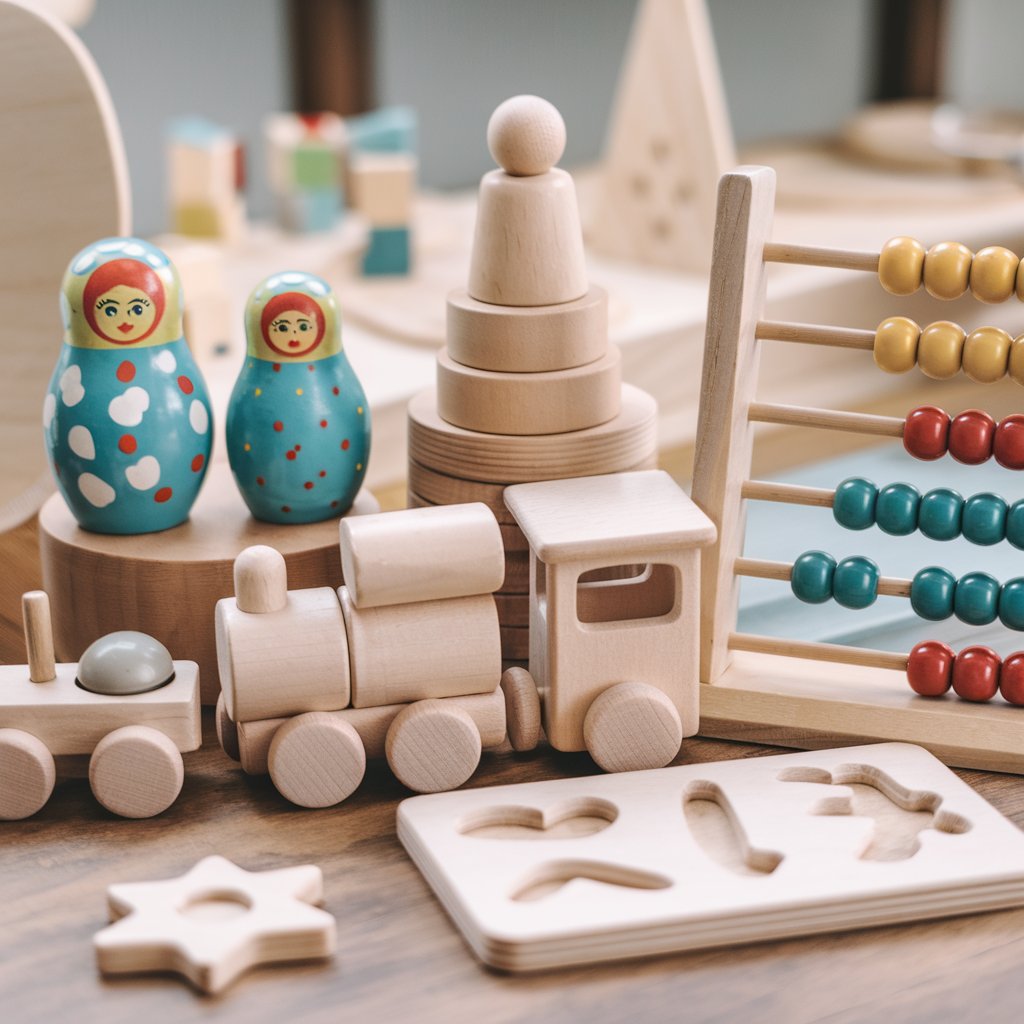Montessori-inspired wooden toys are becoming increasingly popular among parents and educators who seek a more practical, child-centered approach to education. These toys are designed to stimulate independence, focus, and cognitive development in a natural way. Made from simple, durable materials like wood, they encourage learning through exploration and hands-on manipulation. Below, discover what Montessori toys are and why they make an excellent choice for children’s education.

1. What Are Montessori Toys?
Montessori toys follow the principles of the Montessori philosophy, developed by Maria Montessori in the early 20th century. This educational approach is based on the idea that children learn best through practical exploration and interaction with their environment.
Key characteristics of Montessori toys:
- They are simple and have a clear purpose, without distractions like flashing lights or electronic sounds.
- Focused on developing specific skills, such as motor coordination, balance, logic, and creativity.
- Made from natural materials like wood, offering a more tactile and sensory connection to the real world.
These toys promote meaningful learning and encourage children to develop their skills independently.
2. Hands-On Learning: Learning by Doing
One of the main advantages of Montessori wooden toys is that they encourage “learning by doing.” Unlike passive toys, these objects require children to actively engage in play, solving problems, exploring new ideas, and trying different approaches.
Examples of Montessori educational toys:
- Stacking and sorting blocks: Help develop fine motor skills and spatial awareness.
- Simple puzzles: Enhance logical thinking and problem-solving abilities.
- Learning tower: Encourages children to learn about balance and coordination as they build structures.
These toys provide children with the opportunity to take control of their own learning, building self-confidence and greater independence.
Read more: The Benefits of Wooden Toys in Child Development
3. Focus on Motor and Sensory Development
Montessori wooden toys are carefully designed to promote motor and sensory skill development. The texture and weight of wood offer a different sensory experience from plastic toys, allowing children to connect more deeply with the object.
Benefits for motor development:
- Manipulating wooden pieces, like blocks and pegs, helps strengthen fine motor skills.
- Toys that involve stacking, fitting, and organizing objects improve hand-eye coordination.
In addition, the sensory experience provided by wooden toys, such as feeling the natural texture or smelling the wood, stimulates cognitive and emotional development.
4. Encouraging Autonomy and Independence
A core idea of the Montessori philosophy is empowering children to be independent and confident in their abilities. Montessori toys are designed so that children can play and learn on their own without constantly needing adult guidance.
How these toys encourage independence:
- They are intuitive and easy to use, allowing children to discover how they work on their own.
- Many Montessori toys have age-appropriate challenges, helping children solve problems gradually and independently.
This autonomy not only enhances cognitive development but also reinforces the child’s sense of responsibility for their own activities.
5. Durability and Sustainability: Toys Built to Last
Another significant advantage of Montessori wooden toys is their durability. Unlike plastic toys that can break easily, wooden toys are sturdy and can last for years, often being passed down from one generation to another.
Advantages of durability:
- Wooden toys withstand everyday wear and tear, maintaining their integrity over time.
- The production of Montessori wooden toys often follows sustainable practices, using wood from renewable and certified sources.
In addition to promoting effective learning, choosing wooden toys is a more eco-conscious and responsible choice.
Conclusion
Montessori wooden toys are much more than simple playthings – they are valuable tools for child development. These simple, functional toys encourage hands-on learning, independence, and motor development, while also offering a sustainable and durable alternative. By incorporating Montessori toys into your child’s daily routine, you are fostering a richer and more meaningful education.
